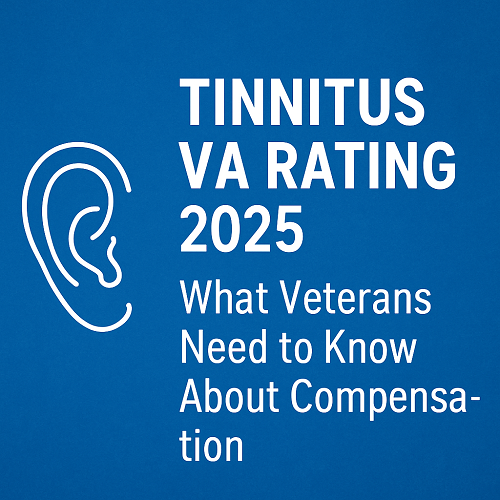Tinnitus VA Rating 2025 is a topic that matters to thousands of veterans across the U.S. Tinnitus is the #1 most claimed VA disability in the country. Because of this, veterans over 50 frequently deal with constant ear ringing that disrupts their daily lives.
Despite its prevalence, many veterans don’t fully understand how to file a VA claim for tinnitus or how compensation works. Moreover, with key updates coming in 2025, it’s essential to stay informed about the latest eligibility rules, filing steps, and relief options.
Therefore, this guide breaks down everything you need to know about the Tinnitus VA Rating in 2025—including how to apply, who qualifies, and even natural ways to manage tinnitus, such as Quietum Plus.
✅ What Is the VA Rating for Tinnitus in 2025?

As of 2025, the VA assigns a maximum rating of 10% for tinnitus—regardless of whether the ringing affects one ear or both. In practical terms, this translates to about $171.23 per month in compensation for qualified veterans.
While the rating may seem low, it’s a critical source of financial support for many. In fact, tinnitus is one of the most frequently approved VA claims, and the process can be relatively straightforward with proper documentation.
✅ Who Can File a Tinnitus VA Claim?

Veterans who were exposed to loud noises during service can file a claim. For example, common sources include:
- Gunfire
- Aircraft engines
- Combat situations
- Heavy military machinery
To qualify, veterans must prove a service connection—typically by submitting service records and medical documentation linking the tinnitus to their military service.
✅ Can You Increase Your Rating for Tinnitus?

The 10% rating cap for tinnitus cannot be increased directly. However, veterans may receive additional compensation by proving that tinnitus caused or worsened related conditions, such as:
- Anxiety
- Insomnia
- Hearing loss
In such cases, filing for these secondary conditions can raise your total VA disability rating. If you’re unsure, speak with a VA-accredited representative or healthcare provider to strengthen your claim.
✅ Natural Support for Tinnitus Relief

VA compensation offers financial help, but unfortunately, it does not treat tinnitus symptoms directly. As a result, many veterans explore natural supplements that support ear and nerve health.
One of the most trusted options among seniors is Quietum Plus—a U.S.-made herbal formula that promotes hearing clarity and nerve function. Moreover, it’s especially helpful for veterans over 50 who deal with constant ear ringing.
👉 Read our full Quietum Plus Review 2025 to learn how this natural supplement may help reduce tinnitus symptoms.
✅ How to File a VA Claim (Step-by-Step)
Filing doesn’t have to be overwhelming. Instead, follow these simplified steps:
- Collect your records – Gather service history showing noise exposure and a current diagnosis of tinnitus.
- File your claim – Submit through VA.gov or ask a Veterans Service Officer (VSO) for assistance.
- Complete your C&P exam – The VA schedules a Compensation & Pension (C&P) exam to confirm your condition.
- Wait for a decision – Most claims take 3 to 6 months, but this can vary depending on your region and documentation.
❓ Tinnitus VA Rating FAQs
Q: Can I get more than 10% VA for tinnitus?
A: No, the tinnitus rating alone is capped at 10%. However, if it leads to secondary issues like anxiety or hearing loss, you can receive a higher combined disability rating.
Q: What’s the success rate of tinnitus claims?
A: Very high. Tinnitus is among the most approved VA disabilities, mainly due to its strong service connection and available medical documentation.
Q: Can I claim tinnitus without hearing loss?
A: Yes. The VA recognizes tinnitus as a separate condition and compensates it even if hearing loss isn’t present.
Q: Do natural supplements like Quietum Plus really work?
A: Many veterans report noticeable relief. Quietum Plus supports ear and nerve health. Still, it should not replace prescribed treatments. Always consult your doctor first.
